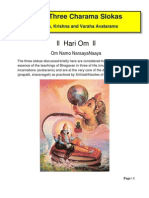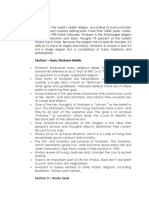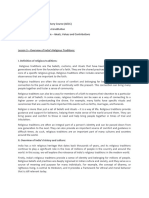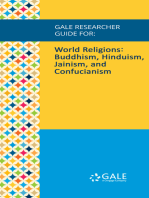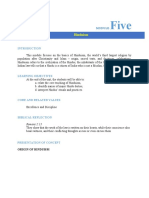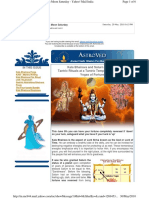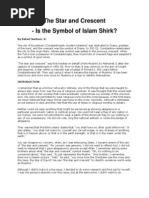0 ratings0% found this document useful (0 votes)
10 viewsHinduism Thursday 4
Hinduism Thursday 4
Uploaded by
Ezekiel Gabriel CartagenaHinduism originated on the Indian subcontinent over 4000 years ago and is considered one of the oldest religions. It has no single founder but developed over many years as a culmination of various beliefs and philosophies that emerged in India. Some of the key beliefs in Hinduism include the divinity of the Vedas, karma, samsara, reincarnation, dharma, and achieving moksha. Practices include yoga, meditation, rituals, worship, and festivals. However, Hinduism also faces issues like the caste system, violence contradicting ahimsa, confusion over samsara and achieving moksha, and challenges around inter-caste marriage.
Copyright:
© All Rights Reserved
Available Formats
Download as DOCX, PDF, TXT or read online from Scribd
Hinduism Thursday 4
Hinduism Thursday 4
Uploaded by
Ezekiel Gabriel Cartagena0 ratings0% found this document useful (0 votes)
10 views2 pagesHinduism originated on the Indian subcontinent over 4000 years ago and is considered one of the oldest religions. It has no single founder but developed over many years as a culmination of various beliefs and philosophies that emerged in India. Some of the key beliefs in Hinduism include the divinity of the Vedas, karma, samsara, reincarnation, dharma, and achieving moksha. Practices include yoga, meditation, rituals, worship, and festivals. However, Hinduism also faces issues like the caste system, violence contradicting ahimsa, confusion over samsara and achieving moksha, and challenges around inter-caste marriage.
Copyright
© © All Rights Reserved
Available Formats
DOCX, PDF, TXT or read online from Scribd
Share this document
Did you find this document useful?
Is this content inappropriate?
Hinduism originated on the Indian subcontinent over 4000 years ago and is considered one of the oldest religions. It has no single founder but developed over many years as a culmination of various beliefs and philosophies that emerged in India. Some of the key beliefs in Hinduism include the divinity of the Vedas, karma, samsara, reincarnation, dharma, and achieving moksha. Practices include yoga, meditation, rituals, worship, and festivals. However, Hinduism also faces issues like the caste system, violence contradicting ahimsa, confusion over samsara and achieving moksha, and challenges around inter-caste marriage.
Copyright:
© All Rights Reserved
Available Formats
Download as DOCX, PDF, TXT or read online from Scribd
Download as docx, pdf, or txt
0 ratings0% found this document useful (0 votes)
10 views2 pagesHinduism Thursday 4
Hinduism Thursday 4
Uploaded by
Ezekiel Gabriel CartagenaHinduism originated on the Indian subcontinent over 4000 years ago and is considered one of the oldest religions. It has no single founder but developed over many years as a culmination of various beliefs and philosophies that emerged in India. Some of the key beliefs in Hinduism include the divinity of the Vedas, karma, samsara, reincarnation, dharma, and achieving moksha. Practices include yoga, meditation, rituals, worship, and festivals. However, Hinduism also faces issues like the caste system, violence contradicting ahimsa, confusion over samsara and achieving moksha, and challenges around inter-caste marriage.
Copyright:
© All Rights Reserved
Available Formats
Download as DOCX, PDF, TXT or read online from Scribd
Download as docx, pdf, or txt
You are on page 1of 2
THE ORIGINS, CORE TEACHING AND OTHER FUNDAMENTALS IN HINDUISM
Prepared by group 4 (Thursday)
What is Hinduism?
Hinduism is a major world religion that originated on the
Indian subcontinent, and includes a wide range of
philosophical, religious, and ritual systems.
When did Hinduism originate?
Hinduism is considered one of the oldest religions in the
world. Its origins date back to the Indus civilization from
the 3rd millennium BCE to the 2nd millennium BCE. This means
that Hinduism could be over 400 decades or 4000 years old. The
name "Hindu" comes from the word "Indus" and refers to the
people who lived near the Indus River in India. It is
important to note that Hinduism is unique in that it is not a
single religion, but a culmination of many traditions and
philosophies².
Who are the founding fathers of Hinduism?
What is special about Hinduism is that there is no single
known founder. It is an amalgamation of various beliefs that
emerged as a culture in India over many years. Some sources
claim that Hinduism was founded by God himself, or by the
Supreme Lord Narayana, who taught religious matters to the
first living being, Brahma. Some attribute the development of
Hinduism to the arrival of the Indo-Aryans around 1500 BC. He
brought the Vedas, a collection of hymns, to the Indus Valley.
Hinduism has various sects and schools of thought with their
own founders and leaders, such as Ramakrishna, who founded the
Ramakrishna Order.
What are the fundamental Beliefs and Practices in Hinduism?
Hinduism is a complex and diverse religion with numerous
beliefs and practices. Here are some of the fundamental
beliefs and practices in Hinduism:
a) Belief in the Divinity of the Vedas: The Vedas are the
ancient scriptures of Hinduism, considered divine and
authoritative.
b) Concept of Karma: Karma is the law of cause and effect,
which holds that the actions of an individual determine
their future fate.
c) Belief in Reincarnation (Samsara): Hindus believe in
samsara, the continuous cycle of life, death, and
reincarnation.
d) Atman: One of the key thoughts of Hinduism is “atman,” or
the belief in soul. This philosophy holds that living
creatures have a soul, and they’re all part of the
supreme soul.
e) Moksha: The goal is to achieve “moksha,” or salvation,
which ends the cycle of rebirths to become part of the
absolute soul.
f) Dharma: Hindus strive to achieve dharma, a code of living
that emphasizes good conduct and morality.
g) Ahimsa: Hindus believe that all life is sacred and
practice ahimsa, noninjury, in thought, word, and deed.
h) Yoga and Meditation: Hinduism teaches three paths to
moksha: bhaktimarga (the path of devotion), jnanamarga
(the path of knowledge or philosophy), and karmamarga
(the path of work and action)3. Yoga and meditation are
important spiritual practices in this regard.
i) Rituals and Worship: Hindu practices might also involve
showing a commitment to the wider community, such as
pilgrimage and charity work. Within the temple there is a
havan, which is a fire sacrifice to the god Agni, with
the fire representing the tongues of the gods.
j) Festivals: Notable celebrations include Diwali or the
Festival of Lights and festivals in honor of Hindu gods
such as Ganesh, Rama Navami, and Navaratri.
It’s important to note that these beliefs can vary among
individuals, communities, and regional areas due to the
diverse nature of Hinduism.
What are the related issues and conflicts of Hinduism?
Hinduism, like many other religions, faces several issues and
conflicts. Here are some of them:
Caste System: The caste system, or separation of classes, is
probably the largest problem within Hinduism. People are born
into their caste and cannot change it. There are five social
classes defined by the Vedic philosophies: Brahmins, Kshatriyas,
Vaishyas, Shudras, and Dalits. Discrimination is relatively
normal in the Hindu religion and especially in southeast Asia1.
Ahimsa: Ahimsa, or non-violence, is a fundamental principle of
Hinduism1. However, violence of various forms has arisen among
religious faiths in India, pitting Hindu against Muslim, Muslim
against Sikh, Sikh against Hindu, and most recently, Hindu
against Christian.
Samsara: Samsara, or the cycle of birth and death, is another
major issue within Hinduism. The belief in reincarnation can lead
to fatalism and acceptance of one’s lot in life rather than
striving for improvement.
Moksha: Moksha, or liberation from the cycle of birth and death,
is the goal of Hinduism. However, the path to moksha is not clear
and can lead to confusion and conflict.
Marriage Responsibility: Marriage within one’s caste is still a
strong norm within Hindu communities. Inter-caste marriages are
on the rise but still tend to be for the more liberal few..
Political Influence: Caste is also especially relevant in
politics. After economics and education, democracy has been the
third most powerful force transforming Indian society. Example,
nearly 50% of the electors of even a highly educated city like
Bangalore consider caste to be the most important reason to vote
for a candidate
You might also like
- Kamigakari Expansion 1 - Requiem For The God SoulDocument177 pagesKamigakari Expansion 1 - Requiem For The God SoulLuciano Júnior100% (3)
- Concept of God in HinduismDocument16 pagesConcept of God in Hinduismthinzaroo3699No ratings yet
- The Three Charama Slokas: An Introductory DiscussionDocument38 pagesThe Three Charama Slokas: An Introductory Discussionvlaxmanan89% (47)
- Introduction To World Religion and Belief Systems: A Written Report On Hinduism G12-05 HSSDocument8 pagesIntroduction To World Religion and Belief Systems: A Written Report On Hinduism G12-05 HSSRainidah Tunday PanambulanNo ratings yet
- Hinduism Is The World's Oldest Religion, According To Many Scholars, With Roots andDocument20 pagesHinduism Is The World's Oldest Religion, According To Many Scholars, With Roots andMarriane TangiNo ratings yet
- Hinduism Is The World's Oldest Religion, According To Many Scholars, With Roots andDocument20 pagesHinduism Is The World's Oldest Religion, According To Many Scholars, With Roots andMarriane TangiNo ratings yet
- Hinduism 11Document9 pagesHinduism 11Xia Negrete AgtocaNo ratings yet
- RDocument7 pagesRJohn Arol De LeonNo ratings yet
- HinduismDocument4 pagesHinduismAmarah IbraNo ratings yet
- Hinduism Summary For RecitationDocument3 pagesHinduism Summary For RecitationXander AlcantaraNo ratings yet
- HinduismDocument31 pagesHinduismAngelica SasanNo ratings yet
- Solano, Nueva Vizcaya: Aldersgate CollegeDocument6 pagesSolano, Nueva Vizcaya: Aldersgate CollegeddddddaaaaeeeeNo ratings yet
- HinduismDocument23 pagesHinduismPrincess Dela Vega0% (1)
- Q3 Aliran Kepercayaan Yang Ada Di Indonesia - Christopher Ray - 10 - 12 CaeciliaDocument3 pagesQ3 Aliran Kepercayaan Yang Ada Di Indonesia - Christopher Ray - 10 - 12 CaeciliaJason IgnasiusNo ratings yet
- HinduismDocument6 pagesHinduismJohn Ryan JacotNo ratings yet
- Unit 3 - CR - Mpu3313 - 03Document66 pagesUnit 3 - CR - Mpu3313 - 03foocm52No ratings yet
- Social Hinduism.2Document6 pagesSocial Hinduism.2Aleksander LanuzaNo ratings yet
- Short Report On HinduismDocument5 pagesShort Report On HinduismYoomi KuromachiiNo ratings yet
- Barro 1Document9 pagesBarro 1patrickkayeNo ratings yet
- Hinduism PDFDocument8 pagesHinduism PDFAkhil SreenadhNo ratings yet
- Cultural DiversitiesDocument12 pagesCultural Diversitiesasain016No ratings yet
- Nine Beliefs of HinduismDocument5 pagesNine Beliefs of Hinduismtejuasha26No ratings yet
- Hinduism Reading (Inso)Document3 pagesHinduism Reading (Inso)laurenq2030No ratings yet
- Religion by Bigyan Shama, Mahendra Multiple Campus DharanDocument11 pagesReligion by Bigyan Shama, Mahendra Multiple Campus Dharanrabin neupane100% (1)
- A Study of HinduismDocument9 pagesA Study of Hinduismpunnasami2022No ratings yet
- Hinduism HandoutDocument5 pagesHinduism HandoutKissyNo ratings yet
- Faith Traditions (HINDUISM)Document4 pagesFaith Traditions (HINDUISM)Stephanie Ginger KarganillaNo ratings yet
- Balaji - FinalHAFHinduism101Document3 pagesBalaji - FinalHAFHinduism101WCSS2015No ratings yet
- Hindu Traditions: Chapter OverviewDocument8 pagesHindu Traditions: Chapter OverviewShubham BhatiaNo ratings yet
- Assignment Hinduism PaperDocument5 pagesAssignment Hinduism PapernocengineerNo ratings yet
- Indian Constitution Unit 5Document9 pagesIndian Constitution Unit 5Rakshitha. A GedamNo ratings yet
- Hinduism Major Religions of The WorldDocument11 pagesHinduism Major Religions of The WorldBenjamin Chisha ChilufyaNo ratings yet
- Hinduism Week 8Document23 pagesHinduism Week 8Marvin Garcia OlivaNo ratings yet
- HinduismDocument6 pagesHinduismhawkeye8431No ratings yet
- Gale Researcher Guide for: World Religions: Buddhism, Hinduism, Jainism, and ConfucianismFrom EverandGale Researcher Guide for: World Religions: Buddhism, Hinduism, Jainism, and ConfucianismNo ratings yet
- Buddhism HinduismDocument6 pagesBuddhism HinduismHIPOLITO, Mica Maureen DC.No ratings yet
- Religion of BuddhismDocument11 pagesReligion of BuddhismHamna NisarNo ratings yet
- Hinduism 2Document15 pagesHinduism 2Fritzgerrald Paulo MiralNo ratings yet
- Hinduism: Romans 2:15Document13 pagesHinduism: Romans 2:15Marissa AsimNo ratings yet
- Spritus PDFDocument11 pagesSpritus PDFrachit3450No ratings yet
- Characteristics of Religion Portfolio:: 1. HinduismDocument2 pagesCharacteristics of Religion Portfolio:: 1. HinduismArreshaNo ratings yet
- HinduismDocument12 pagesHinduismSergio Sar1gumbaNo ratings yet
- Comparative Study 1 NDocument7 pagesComparative Study 1 NReynaldo Lubiano Jr.No ratings yet
- Discuss Theories and Perspectives On Spirituality. Describe The Main Ideas of A Certain BeliefDocument6 pagesDiscuss Theories and Perspectives On Spirituality. Describe The Main Ideas of A Certain BeliefAlexandra SolenNo ratings yet
- Part 1 Hinduism in India Notes-MergedDocument30 pagesPart 1 Hinduism in India Notes-MergedAbhimanyu YadavNo ratings yet
- HOA3 - Assignment #1 - The Relgions of IndiaDocument9 pagesHOA3 - Assignment #1 - The Relgions of IndiaRojun AranasNo ratings yet
- Asian Ethical TraditionsDocument24 pagesAsian Ethical TraditionsLeo BelserionNo ratings yet
- Final Na To LegitDocument4 pagesFinal Na To LegitJudy HebresNo ratings yet
- HinduismDocument13 pagesHinduismTrishlaNo ratings yet
- HINDUISMDocument26 pagesHINDUISMJanet LorestoNo ratings yet
- 4 - HinduismDocument3 pages4 - HinduismStacey PocongNo ratings yet
- World ReligionsDocument40 pagesWorld ReligionsEmanuel PintiliiNo ratings yet
- To World Religions & Belief Systems: 1 Quarter: Module 8Document14 pagesTo World Religions & Belief Systems: 1 Quarter: Module 8Janess HernandezNo ratings yet
- INTRO REPORT 3&4 (KIM L.)Document14 pagesINTRO REPORT 3&4 (KIM L.)vsales1111No ratings yet
- Hinduism.docx EnochDocument8 pagesHinduism.docx Enochwilliamskeys123No ratings yet
- Group 7 Ethics HinduismDocument7 pagesGroup 7 Ethics HinduismFrank Anthony SanchezNo ratings yet
- Thesis HinduismDocument8 pagesThesis Hinduismafjrfisbt100% (2)
- HinduismDocument4 pagesHinduism21rps42No ratings yet
- HinduismDocument47 pagesHinduismaldwinNo ratings yet
- HinduismDocument2 pagesHinduismJoe KimNo ratings yet
- INDIAN ETHOS UnitsDocument47 pagesINDIAN ETHOS UnitschikuuuworxNo ratings yet
- Keieironshu86 145-157Document14 pagesKeieironshu86 145-157Ezekiel Gabriel CartagenaNo ratings yet
- Related Studies WPS OfficeDocument2 pagesRelated Studies WPS OfficeEzekiel Gabriel CartagenaNo ratings yet
- Week 6.selfpeer AssessmentDocument56 pagesWeek 6.selfpeer AssessmentEzekiel Gabriel CartagenaNo ratings yet
- WEEK 5.1 StratificationDocument24 pagesWEEK 5.1 StratificationEzekiel Gabriel CartagenaNo ratings yet
- Peter Solis NeryDocument1 pagePeter Solis NeryEzekiel Gabriel CartagenaNo ratings yet
- Oralcom Q1 Week1Document14 pagesOralcom Q1 Week1Ezekiel Gabriel CartagenaNo ratings yet
- ISL201 Short Notes MCQsDocument18 pagesISL201 Short Notes MCQsAyaan JuttNo ratings yet
- Faith Versus FearDocument3 pagesFaith Versus FearsandeepkakkeriNo ratings yet
- Muzaffarnagar Riots: Petition Filed Before The National Human Rights Commission (NHRC)Document18 pagesMuzaffarnagar Riots: Petition Filed Before The National Human Rights Commission (NHRC)dharma nextNo ratings yet
- Basic Astrology by Anurag SwainDocument36 pagesBasic Astrology by Anurag SwainANURAG SWAIN100% (2)
- Russian OrthodoxDocument8 pagesRussian Orthodoxapi-385758014No ratings yet
- I08 Soriano vs. Laguardia 615 SCRA 254 (2010)Document2 pagesI08 Soriano vs. Laguardia 615 SCRA 254 (2010)Hanna Mari Carmela FloresNo ratings yet
- Outline Weeping Jeremiah-Lamentations AllDocument13 pagesOutline Weeping Jeremiah-Lamentations Alljoshua_pappas100% (2)
- Pre-Spanish Culture: Philippine History With Politics and GovernanceDocument33 pagesPre-Spanish Culture: Philippine History With Politics and GovernanceSheree DamuagNo ratings yet
- L'éveil de L'intelligence, Par J. KrishnamurtiDocument25 pagesL'éveil de L'intelligence, Par J. KrishnamurtiJoop-le-philosopheNo ratings yet
- Qaeedah Burdah (Home-PCs in Konflikt Stehende Kopie 2013-08-07)Document276 pagesQaeedah Burdah (Home-PCs in Konflikt Stehende Kopie 2013-08-07)Imtiaz A. KaziNo ratings yet
- Aqeedah Abu GhazalehDocument102 pagesAqeedah Abu Ghazalehmurad_osman_1No ratings yet
- Compline Ef Version 11-22-1Document14 pagesCompline Ef Version 11-22-1Timothy GreenNo ratings yet
- Should SDAs Pray To The Holy Spirit?Document7 pagesShould SDAs Pray To The Holy Spirit?DERRICK D. GILLESPIE (Mr.)100% (1)
- Mid Term Exam in BibliologyDocument2 pagesMid Term Exam in Bibliologyerman dacasinNo ratings yet
- Durood Shareef/SaalwaatDocument17 pagesDurood Shareef/SaalwaatKelvin Thomas100% (3)
- Module 9 - The Spiritual SelfDocument3 pagesModule 9 - The Spiritual SelfEggol PiperNo ratings yet
- BairavaDocument6 pagesBairavaRajagopal0% (1)
- BasicBuddhism Parâbhava SuttaDocument3 pagesBasicBuddhism Parâbhava Suttanuwan01100% (1)
- Medieval Europe: c.500 - 1500Document54 pagesMedieval Europe: c.500 - 1500belen albinoNo ratings yet
- Dalip Kaur V Pegawai Polis Daerah, Balai Polis Daerah, Bukit Mertajam & AnorDocument9 pagesDalip Kaur V Pegawai Polis Daerah, Balai Polis Daerah, Bukit Mertajam & AnorNUR INSYIERAH MOHAMED ASHRELNo ratings yet
- Lancia NoDocument1 pageLancia NoQuo PrimumNo ratings yet
- The Star and CrescentDocument7 pagesThe Star and CrescentFitri AmirNo ratings yet
- Honesty or Money Script For SkitDocument7 pagesHonesty or Money Script For SkitRiolyn Jhane Arde�aNo ratings yet
- Lampiran SK - KirimDocument305 pagesLampiran SK - KirimALI MAHRUSNo ratings yet
- St. George's Square, Barrow-In-FurnessDocument3 pagesSt. George's Square, Barrow-In-FurnessThomas ScottNo ratings yet
- The Scarlet LetterDocument10 pagesThe Scarlet LetterAndreea MorarNo ratings yet
- The Reign of GraceDocument33 pagesThe Reign of GraceAbebe MenedoNo ratings yet
- Catalog SP 2011Document24 pagesCatalog SP 2011ablock8274No ratings yet


